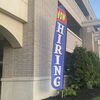National Park Service will invest $5.4M in Acadia's shuttle service
 Courtesy / Downeast Transportation
A new fleet of Island Explorer buses will be coming into use this year.
Courtesy / Downeast Transportation
A new fleet of Island Explorer buses will be coming into use this year.
Acadia National Park, coming off a year of strong growth in visitors arriving by bus, has received federal funding to upgrade the Island Explorer fleet of free shuttle buses.
Island Explorer — a seasonal service that serves the park and is owned and operated by Ellsworth’s Downeast Transportation — has received the first three of 21 new buses on order for 2019.
“We expect that we’ll have 21 new buses on the road by June,” said Downeast Transportation General Manager Paul Murphy.
The cost is $240,000 per bus, for a total of $5.4 million. Funding comes from the U.S. Department of Interior through Acadia National Park, and from the Federal Transit Administration through the Maine Department of Transportation, Murphy said.
The new fleet replaces the system’s existing buses, which are more than a decade old, and expands the fleet by one bus.
The manufacturer is Hometown Coach, a division of Hometown Trolley in Crandon, Wisc. Hometown Trolley is a third-generation family business, and the nation’s only woman-owned transit vehicle manufacturer, according to its website.
The order of 30-passenger propane-powered buses is similar to existing Island Explorer buses, said Murphy.
Downeast Transportation plans to place another order for at least two buses once a substantial number of the current order has arrived, he said. The second order will be for 2020 and will also likely be replacements, rather than an expansion of the fleet, which totals 30.
New transportation plan
Murphy added that Downeast Transportation is awaiting the National Park Service’s final transportation plan for Acadia to better understand what it will mean for the Island Explorer system.
“My guess is it will involve some significant growth for the system,” he said.
According to the National Park Service, in 2017 there were 580,034 riders; in 2018 there were 623,527 — a 7.5% increase. Ridership increased 3% from 2016 to 2017.
It’s hard to say what’s driving the rate increase, Murphy said.
“We’ve operated at or above capacity for the system now for several years, statistically speaking,” he said. “And yet ridership continues to grow. And in 2018 it grew more significantly than it did last year. We crossed the 600,000-passenger threshold for the first time ever.”
He said, anecdotally, the increase could reflect higher park visitation. Park service numbers for 2018 through November show Acadia had 3.523 million visitors, compared with 3.509 million in 2017.
Commercial ridership skyrockets
The National Park Service data also show a substantial increase in the number of commercial bus passengers arriving on Mount Desert Island in 2018.
In 2018, the number was 151,632, a 76.5% increase over 2017’s 85,559.
Friends of Acadia President and CEO David McDonald said the big bump likely reflects a combination of factors, including the increased number of cruise ship visits in 2018.
“A lot of the folks who visit the park by small and big buses are cruise ship passengers,” he said. “The number of ships, the size of the ships, the extended season — the more that increases, that will be reflected in the commercial bus figures.”
Second, he said, there could be a heightened awareness and compliance among commercial bus operators about the importance of getting a park permit and paying the entrance fee.
“That results in more accurate numbers,” McDonald said. “The park has been doing a better job of making folks aware of the importance of the entrance fee and of the congestion problems, with vehicles of all sizes and shapes.”
In addition, he said, “I think that more people are coming to the realization that visiting the park in their own private vehicle will bring challenges, so I think more folks may be signing up for these smaller bus or van tours, which also fall within those numbers. You also would see that reflected in the increase Island Explorer ridership this year. It just reflects a broader public awareness that there are other options out there to do a tour and to get to busier sites.”
Shutdown concerns
McDonald said the continued federal government shutdown is having an impact on hiring seasonal employees.which is lengthy, he said.
“The longer the shutdown goes on, the greater the concern that the impacts will ripple through the spring and summer,” he said.
The federal government’s hiring process, even for seasonal employees, “is an eye-opener,” he said.
For example, a prospective park ranger must go through many weeks of background and medical checks.
“That work needs to be happening right now in order for park staff to be on board in the spring,” he said, adding that it will likely be difficult to catch up after the shutdown.
“I think there will be an extreme bottleneck because things like hiring and contracting don’t all just flow through local park staff,” he said. “A lot of it runs through Boston and Philadelphia and Washington. All of the parks around the country will be facing the same catch-up and backlog, and I’m afraid that some of the broader regional systems will be overwhelmed. It was a challenging situation before the shutdown, just given the way the park is understaffed generally. Now you layer this on and it might well be quite dramatic.”










Comments